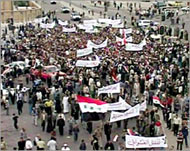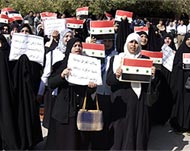Iraqis unite to condemn interim constitution
Thousands of Muslim Sunni and Shia gathered after Friday prayers in al-Adhamya and al-Kadhimya districts in Baghdad to demonstrate against the interim Iraqi constitution.

The demonstrations came on the eve of the first anniversary of the war on Iraq with the crowd swelling as more and more Iraqis joined in.
“Welcome to the blessed gathering, welcome to this demonstration.” A voice chanted from among the crowds.
The Association of Muslim Scholars (AMS), the highest Sunni authority in Iraq organised the demonstration which moved from Abu Hanifa mosque in the predominantly Sunni district of al-Adhamya, to meet with another demonstration organised by Shia clerics, scheduled to start from al-Kadhimya across the river Tigris.
Demonstrators chanted “Yes to Iraq, no to sectarianism, no to US occupation”, in an attempt to show the commitment to national unity among Iraq’s various religions, sects, and ethnicities.
Mounting opposition
The Iraqi interim constitution has found little favour among many Iraqis, who describe it as a “time bomb” that might explode any minute, leaving their country fractured.
Counsel Zaki Jamil Hafidh, chairman of the Arab Union of Jurists in Iraq criticised the legislation saying private interests motivated those who wrote the interim constitution.
 |
|
Baghdad demonstrators hold |
“The constitution would be void if two thirds of voters in three Iraqi governorates vetoed it. It would have to be rewritten in this case” he said, “but this could be repeated over and over due to differences among Iraqi parties, and that means Iraq could stay without a constitution for an unknown period of time.”
Mijbil al-Shaikh Issa also a member of the Arab Union of Jurists expressed grave fears over some clauses in the interim Iraqi constitution.
“The legislation installs the dictatorship of the majority instead of the one man show rule.” Issa said, “They named it interim but it stipulates that its rulings are obligatory to any future national assembly … it is a product of an illegal authority and was rejected by popular and religious authorities in Iraq.”
Partial enthusiasm
Fadhil Muhammad, an Iraqi lawyer, represents a trend that shows satisfaction with the new interim constitution. But he blames the occupation authorities for choosing the wrong time.
“The legislation gives Iraqis a chance to regain control over their issues until the permanent constitution is approved” Muhammad said, “but the Iraqi constitution in place before the occupation was good enough to rule in the interim period. It was derived from the constitutions of France and Egypt and Islamic Sharia.”
|
“It consist of ambiguous articles that would spark future conflicts” the AMS statement said |
“It would have been better for them to have concentrated their efforts on security.
“They could have relied on the old law for a while, but sadly they engaged themselves in writing a new constitution while the country is still in chaos, for instance the headquarters of Arab Union of Jurists in Iraq, of which I am a member was seized by al-Wifaq Islamic Party and we cannot get them out of it, because there is no real authority in the country” Muhammad said.
Religious authorities concerns
Religious authorities in Iraq, rejected the interim constitution signed by the 25 members of Iraq’s US-appointed Governing Council on 8 March 2003 in Baghdad.
The next day, the Iraq-based Iranian Shia authority Ayat Allah Ali al-Sistani criticised the one-day old constitution and issued a statement saying it could not be legitimate unless adopted by an elected governing body.
 |
|
Iraqi students also protested over |
“Any law prepared for the transitional period will not gain legitimacy except after it is endorsed by an elected national assembly,” al-Sistani said in the statement.
The AMS issued a statement in which it slammed the new constitution saying it did not meet the aspirations of Iraqi people.
“It consist of ambiguous articles that could spark future conflicts” the AMS statement said “the association will study the constitution and explain to Iraqi people how it serves the interests of the US and those who move in its orbit in the first place.”
Iraq’s neighbours
Saudi Arabia, Jordan, and Iran welcomed the signing of the document, while Turkey expressed unhappiness over the interim constitution, warning it would pave the way for more instability in the country.
“The interim law does not satisfy us, it increases our concerns,” Turkey’s Anatolia news agency quoted Justice Minister Cemil Cicek, as saying.
Turkey and Iraqi Muslim Shia are concerned over an article allowing Iraqi Kurds to block any future permanent constitution that does not meet their demands.